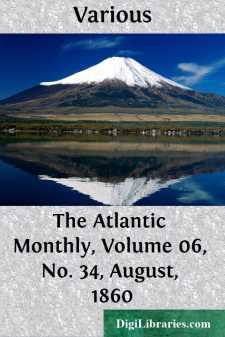Categories
- Antiques & Collectibles 13
- Architecture 36
- Art 48
- Bibles 22
- Biography & Autobiography 813
- Body, Mind & Spirit 142
- Business & Economics 28
- Children's Books 17
- Children's Fiction 14
- Computers 4
- Cooking 94
- Crafts & Hobbies 4
- Drama 346
- Education 46
- Family & Relationships 57
- Fiction 11829
- Games 19
- Gardening 17
- Health & Fitness 34
- History 1377
- House & Home 1
- Humor 147
- Juvenile Fiction 1873
- Juvenile Nonfiction 202
- Language Arts & Disciplines 88
- Law 16
- Literary Collections 686
- Literary Criticism 179
- Mathematics 13
- Medical 41
- Music 40
- Nature 179
- Non-Classifiable 1768
- Performing Arts 7
- Periodicals 1453
- Philosophy 64
- Photography 2
- Poetry 896
- Political Science 203
- Psychology 42
- Reference 154
- Religion 513
- Science 126
- Self-Help 84
- Social Science 81
- Sports & Recreation 34
- Study Aids 3
- Technology & Engineering 59
- Transportation 23
- Travel 463
- True Crime 29
The Atlantic Monthly, Volume 06, No. 34, August, 1860
by: Various
Categories:
Description:
Excerpt
THE CARNIVAL OF THE ROMANTIC.
Whither went the nine old Muses, daughters of Jupiter and the Goddess of Memory, after their seats on Helicon, Parnassus, and Olympus were barbarized? Not far away. They hovered like witches around the seething caldron of early Christian Europe, in which, "with bubble, bubble, toil and trouble," a new civilization was forming, mindful of the brilliant lineage of their worshippers, from Homer to Boethius, looking upon the vexed and beclouded Nature, and expecting the time when Humanity should gird itself anew with the beauty of ideas and institutions. They were sorrowful, but not in despair; for they knew that the children of men were strong with recuperative power.
The ear of Fancy, not long since, heard the hoofs of winged Pegasus striking the clouds. The long-idle Muses, it seemed, had become again interested in human efforts, and were paying a flying visit to the haunts of modern genius from the Hellespont to the Mississippi. They lingered in sunny Provence, and in the dark forest-land of the Minnesingers. In the great capitals, as Rome, Berlin, Paris, London,—in smaller capitals, as Florence, Weimar, and Boston,—in many a village which had a charm for them, as Stratford-on-Avon, Ferney, and Concord in Massachusetts,—in the homes of wonderful suffering, as Ferrara and Haworth.—on many enchanted waters, as the Guadalquivir, the Rhine, the Tweed, the Hudson, Windermere, and Leman,—in many a monastic nook whence had issued a chronicle or history, in many a wild birthplace of a poem or romance, around many an old castle and stately ruin, in many a decayed seat of revelry and joyous repartee,—through the long list of the nurseries of genius and the laboratories of art, they wandered pensive and strangely affected. At length they rested from their journey to hold a council on modern literature. The long results of Christian time were unrolled before them as in a chart. They beheld the dawn of a new historic day, marked by songs of fantastic tenderness, and unwieldy, long, and jointless romances and poems, like the monsters which played in the unfinished universe before the creation of man. The Muses smiled with a look more of complaisance than approval, as they reviewed the army of Troubadours and Minnesingers and the crowd of romancers who followed in their train. They decided that the joyous array of early mediæval literature was full of promise, though something of its tone and temper was past the comprehension of pagan goddesses. The legends of saints and pictures of martyrdoms were especially mysterious to them, and they regarded them raptly, not smilingly, and bowed their heads. Anon their eyes rested on an Italian city, where uprose, as if in interstellar space, an erect figure, with a piercing eye, pleasant as Plato's voice. His countenance was fixed upon the empyrean, and a more than Minerva-like form hovered above him, interpreting the Christian universe; and as he wrote what she dictated, the verses of his poem were musical even to the Muses....












